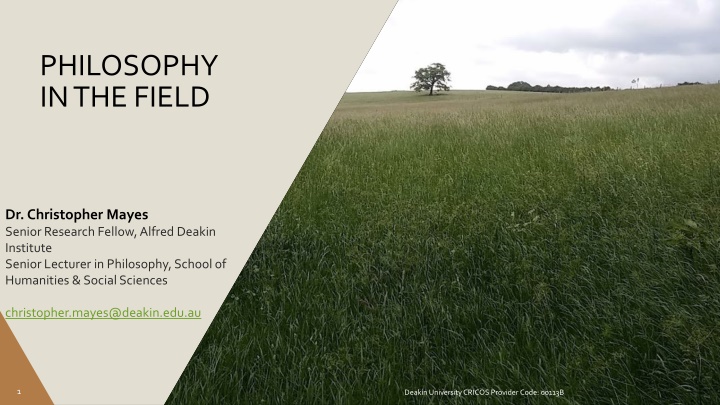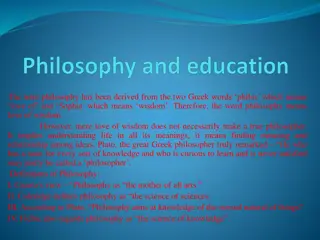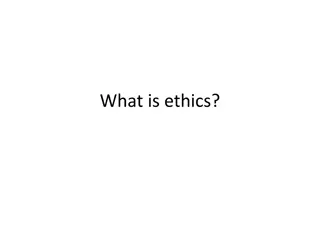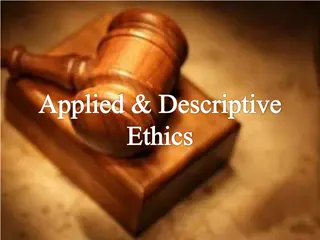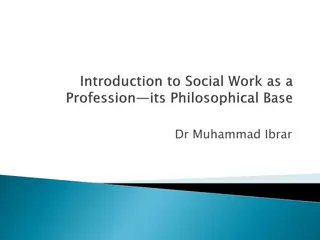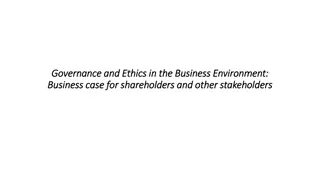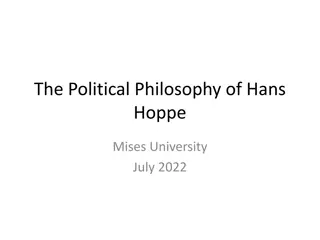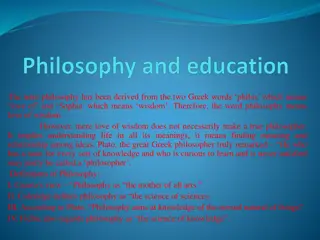Evolution of Applied Ethics in Philosophy
Philosophy, known as the love for wisdom, involves seeking fundamental truths about existence and relationships. In the 1960s and 70s, a shift towards applied ethics emerged as philosophers like Peter Singer emphasized making philosophical discourse accessible to laypersons. This shift was met with some resistance, questioning the relevance of ethics in academic philosophy. However, proponents believed in the practical significance of philosophy in addressing real-world problems.
Download Presentation

Please find below an Image/Link to download the presentation.
The content on the website is provided AS IS for your information and personal use only. It may not be sold, licensed, or shared on other websites without obtaining consent from the author.If you encounter any issues during the download, it is possible that the publisher has removed the file from their server.
You are allowed to download the files provided on this website for personal or commercial use, subject to the condition that they are used lawfully. All files are the property of their respective owners.
The content on the website is provided AS IS for your information and personal use only. It may not be sold, licensed, or shared on other websites without obtaining consent from the author.
E N D
Presentation Transcript
PHILOSOPHY IN THE FIELD Dr. Christopher Mayes Senior Research Fellow, Alfred Deakin Institute Senior Lecturer in Philosophy, School of Humanities & Social Sciences christopher.mayes@deakin.edu.au 1 Deakin University CRICOS Provider Code: 00113B
WHAT IS PHILOSOPHY? Quite literally, the term "philosophy" means, "love of wisdom." In a broad sense, philosophy is an activity people undertake when they seek to understand fundamental truths about themselves, the world in which they live, and their relationships to the world and to each other. As an academic discipline philosophy is much the same. Those who study philosophy are perpetually engaged in asking, answering, and arguing for their answers to life s most basic questions. Florida State University Bertrand Russell wrote that philosophy is the attempt to answer ultimate questions questions about the clarity, coherence, or reasonableness of those concepts and presuppositions that non- philosophers presume to be intelligible or obviously true. - Alabama State University 2 Deakin University CRICOS Provider Code: 00113B
MOVE TO APPLIED PHILOSOPHY IN THE 1960S & 70S for (with the profoundest of bows to my philosophical colleagues) most Australian philosophers have, alas, abjured any interest or concern (at least qua philosophers) in political and social issues. Following their British philosophical brothers in the analytical tradition, most of them take the view that political philosophy is dead and that theorizing about politics in general is a slightly disreputable business that no respectable philosopher should be seen dead doing. - Max Charlesworth, 1967 Max Charlesworth in front of his library. Photo by Max's granddaughter Leila Koren 3 Deakin University CRICOS Provider Code: 00113B
APPLIED ETHICS IN THE 1970S we should try to do philosophy in such a manner that lay people can understand what we say . - Peter Singer, 1971, Must Philosophy Be Academic? Singer recalled being concerned that the kind of stuff I wanted to do would be looked down on by academic philosophers; and this would be a barrier to me having a career in philosophy . - Interview with Peter Singer, 17 June 2020. Peter Singer no Fronteiras do Pensamento Porto Alegre 4 Deakin University CRICOS Provider Code: 00113B
APPLIED ETHICS AT LA TROBE IN THE 1970S Reception among philosophers ...the first paper I read to the philosophy seminar, after I took up my appointment [at La Trobe], one of the central criticisms was, "What's this got to do with philosophy?" ...because it was seen as almost, like, preaching rather than having much to do with philosophy. - Robert Young Chris Mayes: What led you to an interest in applied ethics? Robert Young: ...partly dissatisfaction with the way a lot of ethics was being practised and published [shade thrown at Oxford group]...and the belief that if philosophy was going to be useful, it should contribute to being able to resolve serious problems that were facing people every day of the week. Excerpts from this interview can be heard via the podcastUndisciplinary in the episode Tarred & feathered talking with Robert Young about the emergence of applied ethics in the 1970s . 5 Deakin University CRICOS Provider Code: 00113B
EARLY EMPIRICAL APPROACH For a more detailed discussion of this history see Mayes, Co- producing Bioethics: How Biomedical Scientists and Applied Philosophers Established Bioethics in Australia in Social History of Medicine 2022 Helga Kuhse and Peter Singer 6 Deakin University CRICOS Provider Code: 00113B
2000S EXPERIMENTAL PHILOSOPHY THIS IS YOUR BRAIN ON ETHICS! 7 Deakin University CRICOS Provider Code: 00113B
2010S FIELD PHILOSOPHY 8 Deakin University CRICOS Provider Code: 00113B
FAMILY RESEMBLANCE OF FIELD PHILOSOPHY Public philosophy Philosophy as a way of life Pragmaticism Applied philosophy (ethics, epistemology etc) Philosophy consultant Philosophical counselling
FIELD PHILOSOPHY & THE CURRENT UNIVERSITY RESEARCH ENVIRONMENT Underlying the growing popular distrust of all societal institutions lies a social demand for greater accountability for all those who work in the industry of knowledge production. This is most obvious among scientists who face increasing demands for scientific research to be socially relevant. But with budgets tightening, similar demands will soon be made on philosophy and on all the humanities to justify our existence in terms of its positive and direct impacts on society. Field philosophy, then, serves as an example of how academics can better serve the community which after all is said and done, pays the bills. Robert Frodeman, Experiments in Field Philosophy , NY Times The Stone, 23 Nov 2010. 10 Deakin University CRICOS Provider Code: 00113B
EXAMPLES? 11 Deakin University CRICOS Provider Code: 00113B
CONCLUSIONS STEPPING OUT INTO THE FIELD YOU ARE ALREADY IN: Collaboration Translation Open to input from other fields But, needs institutional AND disciplinary support to: Develop necessary relationships (takes time) Develop and learn new research methodologies
